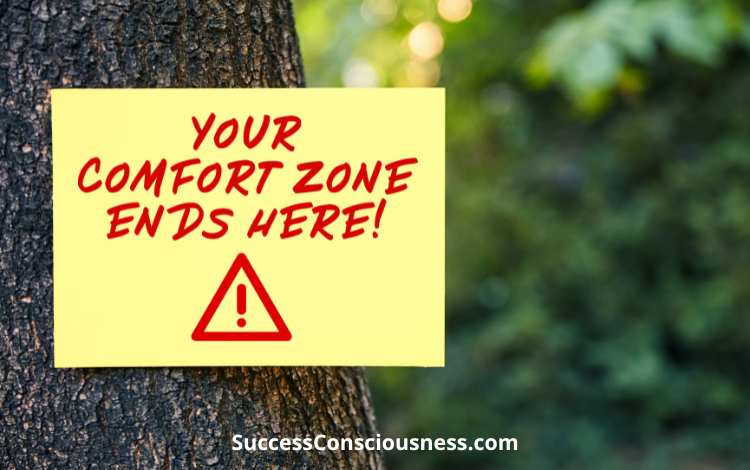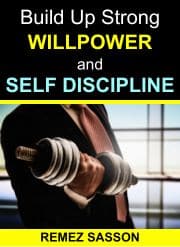
The comfort zone is that cozy, familiar space where we feel safe and secure. It’s a psychological boundary that protects us from the unknown, potential risks, and the discomfort that change often brings.
However, while staying within our comfort zone may offer temporary reassurance, it can also hinder personal growth, limit opportunities, and prevent us from realizing our full potential.
In this post, we will delve into the meaning of the comfort zone, explore its pros and cons, discuss the benefits of stepping beyond its boundaries, and provide guidance on how to embark on this transformative journey.
Understanding the Comfort Zone
Browse our online courses on meditation, positive thinking, overcoming procrastination, confidence, and freedom from distractions.
The comfort zone is a behavioral and psychological state where we feel at ease and experience minimal anxiety or stress.
It encompasses the routines, habits, and situations that are familiar and predictable. Whether it’s a stable job, a routine lifestyle, or repetitive activities, the comfort zone provides a sense of security and control.
Pros and Cons of the Comfort Zone
Pros:
Reduced Stress: Staying within the comfort zone shields us from the anxiety and uncertainty of unfamiliar territory.
Stability: The comfort zone offers a stable and predictable environment, providing a sense of control and order.
Efficiency: Engaging in familiar activities allows us to perform tasks quickly and efficiently due to established skills and routines.
We feel more comfortable in a familiar situation and can express ourselves more freely.
Cons:
Stagnation: By remaining in the comfort zone, personal growth and development may stagnate, leading to complacency and a lack of motivation.
Missed Opportunities: Growth and success often lie outside the comfort zone. Staying within its boundaries can prevent us from seizing new and exciting opportunities.
Limited Learning: Stepping outside the comfort zone opens doors to new experiences, perspectives, and knowledge. Staying confined can restrict personal and intellectual growth.
Benefits of Leaving the Comfort Zone
Personal Growth: Stepping beyond the comfort zone allows personal development and self-discovery. It broadens our horizons, expands our skills, and enhances our adaptability to change.
Increased Confidence: Overcoming challenges outside our comfort zone helps build resilience and confidence in our abilities, boosting self-esteem and self-belief.
Discovering New Passions and Talents: Exploring unfamiliar territories exposes us to activities and interests we may not have otherwise discovered, helping us find new passions and talents.
Enhanced Problem-Solving Skills: Confronting unfamiliar situations encourages creative thinking and problem-solving as we adapt and find innovative solutions.
Expanded Network and Connections: Venturing beyond our comfort zone exposes us to new people, cultures, and perspectives, fostering meaningful connections and expanding our professional and personal network.
Guidance on Going Beyond Your Comfort Zone
Identify Your Comfort Zone: Reflect on areas where you feel most comfortable and examine the routines and habits that keep you there.
Set Goals: Define clear goals and aspirations outside your comfort zone, ensuring they align with your values and passions.
Start Small: Begin by taking small steps outside your comfort zone. Gradually expose yourself to new experiences and challenges that push your boundaries.
Embrace Discomfort: Understand that discomfort is a natural part of growth. Embrace it as an opportunity for learning and development rather than avoiding it.
Develop a Growth Mindset: Adopt a growth mindset that embraces challenges, values effort, and views failures as learning experiences rather than setbacks.
Seek Support: Surround yourself with a supportive network of friends, mentors, or coaches who can provide guidance, encouragement, and accountability.
Learn from Failure: Recognize that setbacks and failures are stepping stones toward success. Analyze them, extract lessons, and use them as stepping stones toward future success.
Failure is not the end; it’s merely a temporary setback on the path to greatness.
We gain valuable insights into what went wrong and how we can improve by dissecting our failures. We learn to embrace the growth mindset that sees failure as an opportunity for growth and development.
Leaving the Comfort Zone
Leaving the comfort zone requires a shift in mindset. Instead of fearing the unknown, we learn to view it as an adventure – an opportunity to discover hidden strengths, passions, and potentials.
We must remind ourselves that growth and self-discovery happen outside our comfort zone. By taking risks, trying new things, and embracing uncertainty, we allow ourselves to evolve into the best versions of ourselves.
As we step beyond our comfort zone, it’s a good idea to surround ourselves with a supportive network of friends, mentors, or coaches who believe in our potential. These people can provide guidance, encouragement, and a sense of accountability when faced with challenges.
They can remind us of our capabilities and help us stay focused on our goals, even when doubts creep in.
Setting Realistic Goals
Another crucial aspect of leaving the comfort zone is to set realistic goals. These goals should push us beyond our current abilities but remain attainable.
We can make the process less overwhelming by breaking down larger goals into smaller, manageable steps. Each small victory becomes a building block that propels us toward our ultimate aspirations.
Celebrating Our Progress
Lastly, it’s vital to celebrate our progress along the way. Acknowledge the courage it takes to step outside the comfort zone and recognize the achievements, no matter how small.
By celebrating milestones, we reinforce positive behaviors and develop a sense of self-validation that motivates us to continue pushing our boundaries.
In conclusion, don’t let the fear of leaving your comfort zone hold you back from experiencing personal growth, seizing opportunities, and achieving your full potential.
Embrace the discomfort, analyze your failures, surround yourself with support, set realistic goals, and celebrate your progress.
Remember that the magic of life happens when we dare to step into the unknown and discover what lies beyond our comfort zone.
Browse our online courses on meditation, positive thinking, overcoming procrastination, motivation, confidence, and freedom from distractions.


